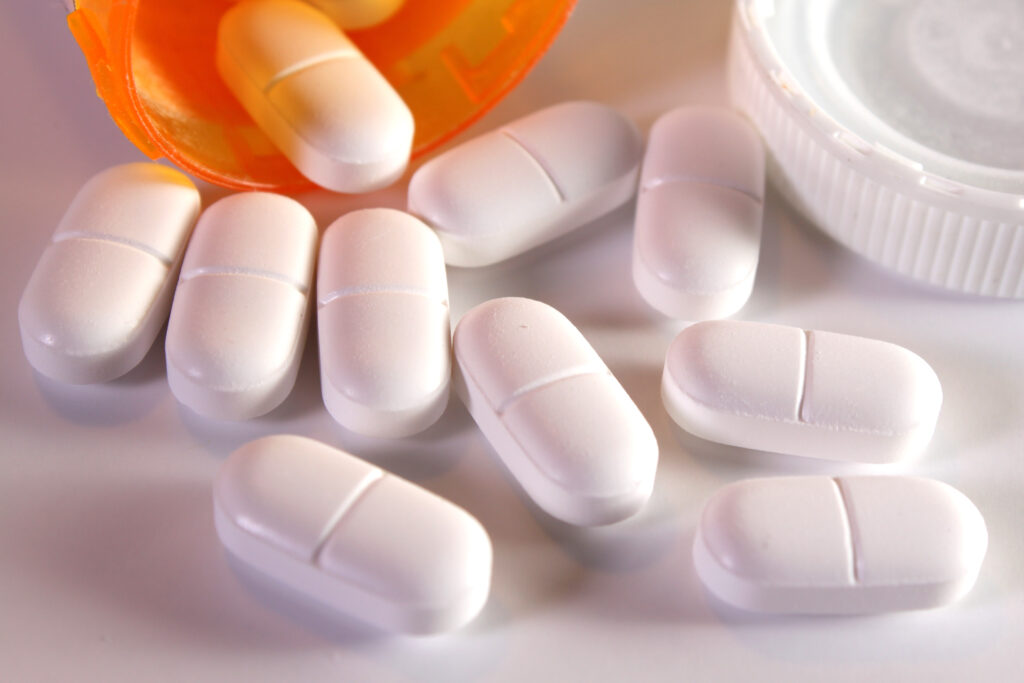What is Vicodin?
Vicodin is a prescription painkiller that is used to treat moderate to severe pain. Vicodin is a tablet from hydrocodone which is a synthetic opioid and acetaminophen. Vicodin comes in tablet forms in varying dosages to provide different levels of care to treat severe pain and muscle aches. Vicodin is an opioid medication that works to bind the opioid receptors in the brain which helps to lessen the feelings or perceptions of pain. Hydrocodone acts as a endorphin receptor in the central nervous system. This can cause analgesia (pain relief), respiratory depression, sedation, and euphoria.

Vicodin Effects
Vicodin is an opioid drug that is a central nervous system depressant that works to slow brain activity and, ultimately, affect and slow down other body functioning. When you taking vicodin, you will feel symptoms including:
- Dizziness
- Drowsiness
- Impaired coordination
- Loss of consciousness
- Nausea
- Vomiting
- Overdose
- Shallow, abnormal breathing
- Slowed heart rate
Signs of Vicodin Abuse and Addiction
Vicodin addiction is unique to each person that it impacts. Depending on the severity of your drug abuse, your life will be impacted in different ways from your substance abuse. There are some common signs that individuals living with a vicodin addiction will experience. Common signs of a vicodin addiction and abuse are:
- Taking Vicodin in larger dosages or for longer than you were prescribed for.
- Wanting to quit your substance use disorder but unable to do so
- Your time is consumed with getting, using, or recovering from use of Vicodin.
- Experiencing strong drug cravings for Vicodin.
- Experiencing challenges in work, school, or family life and commitments because of Vicodin use.
- Continuing to use Vicodin even after experiencing negative consequences in your life
- Loss of interest in social circles, hobbies, and interests due to your Vicodin use.
- Engaging in substance abuse even when it puts you in danger.
- Developing a tolerance to Vicodin to reach the same desired effects
- Experiencing withdrawal symptoms, and having to take more Vicodin to avoid the withdrawal symptoms
Vicodin Withdrawal Symptoms
Your vicodin withdrawal symptoms will be dependent on your specific history of substance abuse. The longer you have been engaging in your drug addictions, the more it increases the risk of experiencing moderate to severe withdrawal symptoms. If you are looking to stop your substance abuse, it is recommended that you do so within a medical detox services near you to ensure your safety and well-being and avoid any medical complications.
Common signs and symptoms of vicodin withdrawal are:
- Psychological symptoms of irritability, mood swings, anxiety, depression, and confusion
- Appetite changes including loss of appetite or weight loss
- Physical symptoms, like hand or body tremors, enlarged pupils, nausea and vomiting, cold sweating, diarrhea, salivation, chills, or goosebumps, rapid, abnormal breathing, and muscle aches or pains
- Sleep patterns disturbances, like restlessness, insomnia, or exhaustion
- Cold or flu-like symptoms including runny nose, fever, sweating, and nasal or chest congestion
Long Term Side Effects of Vicodin Abuse
Vicodin abuse for a prolonged period of time can create significant long term effects and medical complications that can impact your overall physical and mental health conditions. Common signs and long term effects from vicodin addiction and abuse are:
- Increased feelings of pain
- Consistent state of sedation
- Irritability and agitation
- Anxiety disorder and inability to manage stress
- Problems with memory
- Liver damage/failure
- Yellow eyes or skin
- Sores and ulcers
- Eyelid puffiness
- Skin rash
Vicodin Addiction Treatment
If you or a loved one have been living with a substance use disorder and are ready to address and heal from your drug addictions, Novo Detox offers a substance abuse treatment program that provides a whole person integrated approach to addiction treatment. Patients will be able to safely overcome the physical dependence to vicodin with the support of a medical detox where any medical complications and withdrawal symptoms will be monitored and treated by our team of medical professionals. Patients will then transition into drug rehabs where you can gain perspective on what emotions, thoughts, and traumas have influenced your addictive behaviors. With the support of behavioral therapy, dual diagnosis treatment, holistic treatment, and medically assisted treatment, patients will be able to heal from the root causes of drug addictions while gaining the skills and tools for relapse prevention and addiction recovery.
Contact Novo Detox to hear more about the individualized treatment plan that will be developed to assist you in healing from your substance abuse and paving your road to recovery.




